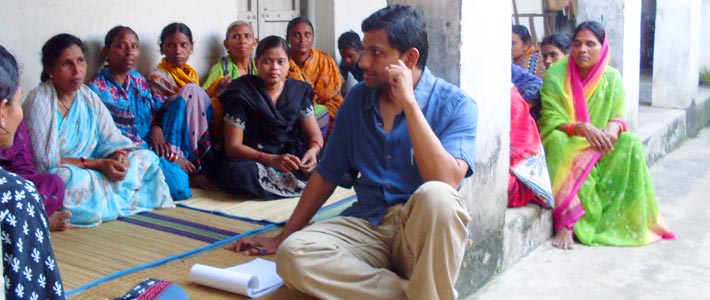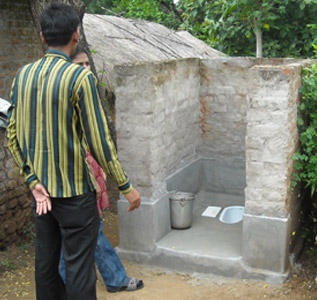
Undertaking an exercise in learning, I had last month visited BISWA, an MFI based in Orissa, that apart from providing microcredit, is involved in a wide range of activities related to health, education, water, sanitation and livelihood enhancement programs.
My visit took me to the villages of Boratonga, Amkuni and Haldi in Western Orissa – largely remote and rural locations; also had visited semi-urban and urban projects in Sambalpur and Bhubaneswar.
I have tried to classify some of the learning’s under the different interventions that BISWA has been making as below:
Water supply and purification intervention
BISWA employs two models to provide rural households with access to drinking water. One is through leveraging the ‘Swajaldhara’ scheme of the Government of India and the other is through installation of tube wells in villages.
Under the ‘Swajaldhara’ scheme, the government provides 90% of the funding required for the construction of water tanks in villages and the connection from these tanks to water stand posts that can be accessed by rural communities. BISWA provides credit through its Self Help Groups (SHGs) to assist rural communities in raising the residual 10% of funding required in completing the program. Additionally it provides further credit to households that want connectivity from water stand posts to their homes. The total loan amounts to Rs 5000 to 6000 per connection.
BISWA also provides credit to rural households for the construction of tube wells that costs about Rs 60, 000. This loan is made to about 20 households through each SHG, with each household responsible for an equal share in the loan.
Sanitation intervention
 Government of India’s Total Sanitation Campaign (TSC) provides a reimbursement of Rs 2200 to each rural household that constructs a sanitary toilet, as per guidelines listed under the program. However households find it difficult to invest upfront to build a toilet and have it inspected before collecting the reimbursement from the government.
Government of India’s Total Sanitation Campaign (TSC) provides a reimbursement of Rs 2200 to each rural household that constructs a sanitary toilet, as per guidelines listed under the program. However households find it difficult to invest upfront to build a toilet and have it inspected before collecting the reimbursement from the government.
BISWA through its SHGs, funds households that want to construct a toilet and once the inspection by the government appointed engineer is done, it collects the subsidy from the government. The financial burden on the household is thus removed by this intervention and the household is able to build a sanitary toilet.
Dealing with multiple households at a time, it is able to bring down the cost of construction per household and is able to make a profit of Rs 200 per sanitation ‘loan’.
Slum upgradation intervention
Covering about 7 Slums with close to 700 households in Bhubaneswar, BISWA is working with the Govt. of Orissa, the Bhubaneswar Municipal Corporation and Dell Foundation in providing individual piped water connections and toilets connected to the underground sewerage system to each household.
Under this program the Public Health Engineering Organization (PHEO) has entered an agreement with BISWA to guarantee quality and quantity of water supplied to the slums as well as for pipe maintenance. BISWA, for its part, has been working with most of these slums as part of its microfinance program and is responsible for community mobilization, education and provision of credit for last mile connections. BISWA also provides credit to households for the construction of toilets that will be connected to the sewer network.
Educational intervention
Among all the interventions, the efforts by BISWA staff in educating villagers as regards the benefits of clean water and sanitation, was a highlight of my visit. Apart from speaking to the villagers, BISWA staff encouraged them to set up committees that focused on issues concerning water and sanitation interventions in their respective areas.
All in all, it was really inspiring to see access to these services provided at far flung remote villages, and very interesting to understand the various models used to provide these services.
——
Anand Sahasranaman from the Trust (presently known as Dvara Holdings) contributed to this post.


2 Responses